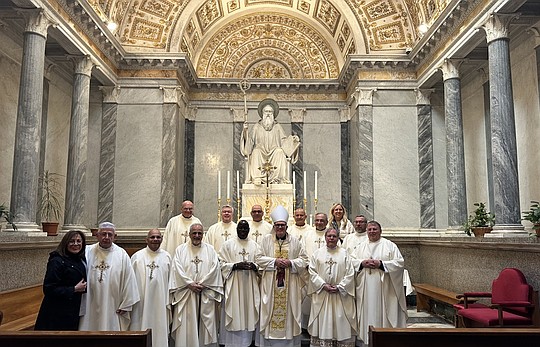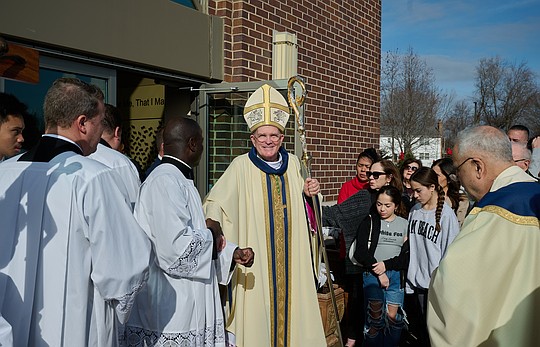Ukraine's healing needs justice, repentance and decades of effort, say experts
March 1, 2023 at 3:26 p.m.

Any theology of healing for Ukraine must first begin not with a point but a "person of departure," explained Metropolitan Archbishop Borys Gudziak of the Ukrainian Archeparchy of Philadelphia, head of Ukrainian Catholics in the U.S.
"The question for Jesus was seeing the concrete reality. Pope Francis has been summoning Catholics for the last 10 years to not be abstract, but to see the suffering of the poor and the marginalized," said the archbishop.
Citing the parable of the Good Samaritan (Lk 10:29-37), Archbishop Gudziak likened Ukraine – whose people have endured "one genocidal wave after another" throughout the centuries – to "the wounded victim over whom we stand today."
Repeated repressions, mass starvations and executions, particularly during the 20th century under both Soviet and Nazi regimes, killed millions of Ukrainians, explained the archbishop.
After declaring independence from the former Soviet Union in 1991, Ukraine, which at the time possessed the world's third-largest nuclear arsenal, "not only wanted peace, (but) made itself completely vulnerable for peace," Archbishop Gudziak said.
Ukraine then signed the 1994 Budapest Memorandum, according to which the U.S., the United Kingdom and the Russian Federation promised Ukraine security assurances in return for relinquishing its nuclear weapons.
Two decades later, Russia violated the agreement by invading Ukraine's Crimea region while backing separatist factions in the Donetsk and Luhansk provinces. From 2014 to 2021, some 14,400 Ukrainians were killed and 39,000 injured in Russian attacks, according to the United Nations Office of the High Commissioner for Human Rights.
[[In-content Ad]]
Since the February 2022 invasion, more than 8,000 Ukrainian civilians have been killed and more than 13,200 injured. Officially 13,000 Ukrainian soldiers have been killed, according to Ukraine's government, although the actual number is likely much higher. More than 8 million refugees have been recorded across Europe, with 4.85 million registered for some form of temporary protection, according to the U.N. High Commissioner for Refugees.
More than 16,200 Ukrainian children have been abducted by Russia, according to Ukraine's government. With some 66,000 war crimes reported – including rape, torture and summary executions – Ukraine has filed charges of genocide by Russia with the International Court of Justice.
"This is the wounded victim over whom we stand today," said Archbishop Gudziak. "The question is, do we walk by? Do we have a theoretical discussion, or do we touch the wounds, raise and lift the beaten-down person, give this person comfort and assure justice?"
Deacon Perry Hamalis, a Greek Orthodox deacon and professor of religion at North Central College, noted that Russia, unlike Germany, has never fully reckoned with the atrocities of its totalitarian past, let alone its present.
In December 2021, Russia's Supreme Court ordered the closure of Memorial International, which had spent some three decades documenting Soviet crimes.
"One of the most important components of the possibility for peace in the future has to be acknowledgment of responsibility and acts of genuine repentance, a willingness to see … and say, 'We were wrong. We violated our identity, we apologize for what has happened, and we are eager to start fresh and move forward,'" said Deacon Hamalis.
Such an admission must include "not simply the need for war crimes trials, which are absolutely necessary in the post-bellum context," Deacon Hamalis said. There must also be "authentic repentance" that recognizes the imperialist concept of "Russkiy mir" ("Russian world") – invoked by Russian president Vladmir Putin to justify aggression against Ukraine – is "an ideology, not a theology" that has "deeply destroyed" the ecclesiology of the Russian Orthodox Church, said Deacon Hamalis.
"Russkiy mir … is an absolute distortion of what it means to think in terms of a Christ, where one is baptized into Christ first and foremost … as a child of God, a member of a body that includes all other people," Deacon Hamalis said.
The damage within the Orthodox Church has extended well beyond Russia's borders, said Gayle Woloschak, president of the Orthodox Christian Association of Medicine, Psychology and Religion, who said the conflict "has split the Orthodox Church in the U.S. very strongly and has been very hurtful."
Elizabeth Prodromou, visiting scholar in the International Studies Program at Boston College and nonresident senior fellow at the Atlantic Council’s Eurasia Center suggested that Churches must "look to the Gospels … to the language, resources and teachings of the Church to find different kinds of terms" – such as "love, peace, justice, judgment, mercy, forgiveness and repentance" – to advance the healing process.
Archbishop Gudziak cautioned that "the road to peace will not be easy," since Russia's invasion "is not an easy story," but rather one "dripping with blood" and "marked by torture," producing "deep, deep trauma."
"Real peace and justice mean that Ukraine will never be a colony of Russia," he said. "That is non-negotiable, because it is a question of God-given human dignity."
Gina Christian is a national reporter for OSV News. Follow her on Twitter at @GinaJesseReina.
Related Stories
Friday, January 02, 2026
E-Editions
Events
Any theology of healing for Ukraine must first begin not with a point but a "person of departure," explained Metropolitan Archbishop Borys Gudziak of the Ukrainian Archeparchy of Philadelphia, head of Ukrainian Catholics in the U.S.
"The question for Jesus was seeing the concrete reality. Pope Francis has been summoning Catholics for the last 10 years to not be abstract, but to see the suffering of the poor and the marginalized," said the archbishop.
Citing the parable of the Good Samaritan (Lk 10:29-37), Archbishop Gudziak likened Ukraine – whose people have endured "one genocidal wave after another" throughout the centuries – to "the wounded victim over whom we stand today."
Repeated repressions, mass starvations and executions, particularly during the 20th century under both Soviet and Nazi regimes, killed millions of Ukrainians, explained the archbishop.
After declaring independence from the former Soviet Union in 1991, Ukraine, which at the time possessed the world's third-largest nuclear arsenal, "not only wanted peace, (but) made itself completely vulnerable for peace," Archbishop Gudziak said.
Ukraine then signed the 1994 Budapest Memorandum, according to which the U.S., the United Kingdom and the Russian Federation promised Ukraine security assurances in return for relinquishing its nuclear weapons.
Two decades later, Russia violated the agreement by invading Ukraine's Crimea region while backing separatist factions in the Donetsk and Luhansk provinces. From 2014 to 2021, some 14,400 Ukrainians were killed and 39,000 injured in Russian attacks, according to the United Nations Office of the High Commissioner for Human Rights.
[[In-content Ad]]
Since the February 2022 invasion, more than 8,000 Ukrainian civilians have been killed and more than 13,200 injured. Officially 13,000 Ukrainian soldiers have been killed, according to Ukraine's government, although the actual number is likely much higher. More than 8 million refugees have been recorded across Europe, with 4.85 million registered for some form of temporary protection, according to the U.N. High Commissioner for Refugees.
More than 16,200 Ukrainian children have been abducted by Russia, according to Ukraine's government. With some 66,000 war crimes reported – including rape, torture and summary executions – Ukraine has filed charges of genocide by Russia with the International Court of Justice.
"This is the wounded victim over whom we stand today," said Archbishop Gudziak. "The question is, do we walk by? Do we have a theoretical discussion, or do we touch the wounds, raise and lift the beaten-down person, give this person comfort and assure justice?"
Deacon Perry Hamalis, a Greek Orthodox deacon and professor of religion at North Central College, noted that Russia, unlike Germany, has never fully reckoned with the atrocities of its totalitarian past, let alone its present.
In December 2021, Russia's Supreme Court ordered the closure of Memorial International, which had spent some three decades documenting Soviet crimes.
"One of the most important components of the possibility for peace in the future has to be acknowledgment of responsibility and acts of genuine repentance, a willingness to see … and say, 'We were wrong. We violated our identity, we apologize for what has happened, and we are eager to start fresh and move forward,'" said Deacon Hamalis.
Such an admission must include "not simply the need for war crimes trials, which are absolutely necessary in the post-bellum context," Deacon Hamalis said. There must also be "authentic repentance" that recognizes the imperialist concept of "Russkiy mir" ("Russian world") – invoked by Russian president Vladmir Putin to justify aggression against Ukraine – is "an ideology, not a theology" that has "deeply destroyed" the ecclesiology of the Russian Orthodox Church, said Deacon Hamalis.
"Russkiy mir … is an absolute distortion of what it means to think in terms of a Christ, where one is baptized into Christ first and foremost … as a child of God, a member of a body that includes all other people," Deacon Hamalis said.
The damage within the Orthodox Church has extended well beyond Russia's borders, said Gayle Woloschak, president of the Orthodox Christian Association of Medicine, Psychology and Religion, who said the conflict "has split the Orthodox Church in the U.S. very strongly and has been very hurtful."
Elizabeth Prodromou, visiting scholar in the International Studies Program at Boston College and nonresident senior fellow at the Atlantic Council’s Eurasia Center suggested that Churches must "look to the Gospels … to the language, resources and teachings of the Church to find different kinds of terms" – such as "love, peace, justice, judgment, mercy, forgiveness and repentance" – to advance the healing process.
Archbishop Gudziak cautioned that "the road to peace will not be easy," since Russia's invasion "is not an easy story," but rather one "dripping with blood" and "marked by torture," producing "deep, deep trauma."
"Real peace and justice mean that Ukraine will never be a colony of Russia," he said. "That is non-negotiable, because it is a question of God-given human dignity."
Gina Christian is a national reporter for OSV News. Follow her on Twitter at @GinaJesseReina.










